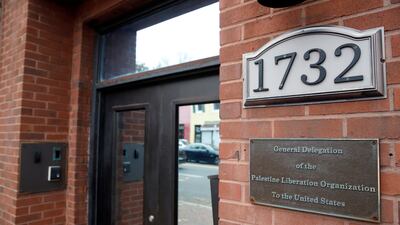Leading Palestinian political factions will meet in Cairo on Monday to push ahead with reconciliation efforts, despite fundamental disputes ahead of a key December 1 deadline.
The talks come as Palestinians face rising tensions with the United States over the threatened closure of their office in Washington, but this is seen as unlikely to affect the outcome.
Tensions between the two largest Palestinian groups – Fatah and Hamas – have reemerged since they signed a reconciliation deal last month, but delegates hope the meeting of 13 factions could push the bid ahead. The fate of Hamas's vast armed wing, however, remains unclear.
Fatah, led by Palestinian president Mahmoud Abbas, has been at loggerheads with Hamas since the Islamist movement seized control of Gaza in 2007.
But on October 12, the two parties signed a deal under which Hamas will hand back civilian power to Mr Abbas's internationally recognised Palestinian Authority government, based in the Israeli-occupied West Bank, by December 1.
In a crucial first step, Hamas stuck to a November 1 deadline to hand over the border crossings between Gaza and its neighbours Egypt and Israel.
But since that date, progress has appeared to stall, with Palestinian prime minister Rami Hamdallah suggesting the PA needed full security control of Gaza before further steps could be taken. Hamas rejected that, accusing Mr Hamdallah of seeking to change the terms of the agreement.
The Fatah-dominated Palestinian government has also refused to remove crippling measures targeting Gaza – including reducing electricity.
Palestinians and international powers hope an implemented reconciliation deal could help to ease the suffering of Gaza's two million residents, who suffer from high rates of poverty and unemployment.
The Cairo talks come amid a rise in US-Palestinian tensions over a threatened closure of the office in Washington of the Palestine Liberation Organisation, which the international community recognises as representing all Palestinians.
The threatened closure was apparently over a Palestinian suggestion of taking the issue of Israeli settlements on occupied land to the International Criminal Court.
But Palestinian political analyst George Giacaman said: "I don't think the tensions between the PA and Washington will affect the reconciliation process. "The problems that the PA is facing regarding Gaza are of a different nature: how will they cope with the financial and humanitarian situation in Gaza, how will they control the groups that Hamas struggled to control until now?"
Tomorrow's meeting brings together 13 factions, and analysts expect them all to back reconciliation. Wasel Abu Yousef, a senior PLO official, said the talks could last until Thursday. "I think this meeting will be a huge step towards the removal of all the obstacles to reconciliation," he said.
The topics to be discussed are well known – societal reconciliation, security, forming a potential unity government, elections and whether Hamas could eventually join the PLO.
The most controversial issue remains security – and the future of Hamas's military wing.
Bassem Naim, a top Hamas official, said it was impossible for them to consider giving up their weapons.
He said that in the West Bank, where Mr Abbas's government is meant to have partial self rule, the Israeli army in reality operates with impunity – including in areas nominally under full Palestinian control.
"No Palestinian here can accept this model as a model for the security we are looking for," he said. He also said the party would not consider recognising Israel at this time.
For the Israelis and the Americans, however, such a situation would be unacceptable.
Both have said they would reject any government including Hamas unless the Islamists gave up their weapons.

Palestinians to meet in Cairo to discuss reconciliation
Talks come amid tensions with the US over threatened closure of PLO office
Most popular today
